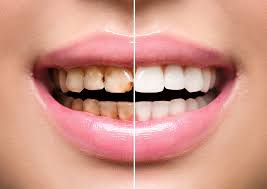Maintaining good oral health requires more than just daily brushing and flossing. Regular visits to the dentist for professional cleanings play a vital role in preventing gum disease, cavities, and other dental issues. However, not all dental cleanings are the same. Many people are familiar with routine dental cleanings, but fewer understand the role of deep cleaning procedures, such as teeth scaling.
Both procedures help maintain oral health, but they serve different purposes. Understanding the difference between teeth scaling and a standard dental cleaning can help you make informed decisions about your dental care. We are dedicated to providing comprehensive dental solutions that enhance both oral health and confidence. That is why we believe in educating our patients about the best treatments for their needs.
What is a Dental Cleaning?
A standard dental cleaning, also known as prophylaxis, is a preventive treatment that focuses on removing plaque and tartar from the surface of the teeth and along the gumline. This procedure is typically performed by a dental hygienist and is recommended at least twice a year to maintain healthy teeth and gums.
What Happens During a Dental Cleaning?
- Plaque and Tartar Removal
- The hygienist uses a scaler to gently remove plaque and tartar buildup on the tooth surface and around the gumline.
- Plaque is a soft, sticky film containing bacteria, while tartar is hardened plaque that cannot be removed with brushing alone.
- Polishing
- After tartar removal, the teeth are polished using a special gritty toothpaste to remove stains and smooth the enamel.
- Flossing and Rinsing
- The hygienist will floss between the teeth to remove any remaining debris and rinse your mouth with water or a fluoride solution.
- Fluoride Treatment (Optional)
- A fluoride treatment may be applied to strengthen the teeth and help prevent cavities.
Why is Regular Dental Cleaning Important?
- Prevents cavities by removing plaque before it leads to decay.
- Reduces the risk of gum disease by keeping the gums free from bacterial buildup.
- Helps prevent bad breath by eliminating food particles and bacteria.
- Keeps teeth looking clean and polished, enhancing confidence in your smile.
What is Teeth Scaling (Deep Cleaning)?
Teeth scaling, also known as deep cleaning, is a more intensive procedure designed to treat gum disease. It is required when plaque and tartar accumulate below the gumline, leading to gum inflammation and infection. Unlike a regular dental cleaning, which focuses on the surface of the teeth, teeth scaling involves cleaning deep beneath the gums.
When is Teeth Scaling Necessary?
If gum disease progresses beyond the early stages (gingivitis), the gums begin to pull away from the teeth, creating pockets where bacteria can thrive. This can lead to symptoms such as:
- Persistent bad breath
- Red, swollen, or bleeding gums
- Gum recession
- Loose teeth or tooth sensitivity
At this stage, a regular dental cleaning is not enough to remove the plaque and tartar trapped deep in the gum pockets. Teeth scaling is necessary to halt the progression of gum disease and prevent further damage.
What Happens During Teeth Scaling?
- Deep Plaque and Tartar Removal
- The dentist or hygienist uses specialized instruments to remove plaque and tartar from below the gumline and in deep pockets around the teeth.
- Ultrasonic scalers may be used to break down hardened tartar.
- Root Planing
- This procedure smooths out the tooth roots, making it easier for the gums to reattach to the teeth and reducing the risk of bacteria accumulation.
- Antibacterial Treatment
- In some cases, the dentist may apply an antibacterial solution to help eliminate infection and promote healing.
- Follow-Up Care
- Teeth scaling is often performed over multiple visits, depending on the severity of gum disease. A follow-up appointment is usually necessary to monitor healing.
Should You Get Teeth Scaling?
Although deep cleaning is highly effective in treating gum disease, it is not necessary for everyone. Many people assume that a deep cleaning is just a more thorough version of a regular dental cleaning, but this is not the case.
Before deciding on teeth scaling, consider the following factors:
- Time Commitment – Deep cleaning usually requires at least two visits, each lasting up to two hours.
- Post-Treatment Sensitivity – Patients may experience tooth sensitivity, swollen gums, and minor discomfort for a few days after the procedure.
- Risk of Infection – While the risk is low, people with weakened immune systems may be more susceptible to infection.
- Cost Considerations – Teeth scaling is more expensive than a regular cleaning, but it is often covered by dental insurance when deemed necessary for treating gum disease.
The best way to determine if you need teeth scaling is by consulting with your dentist. We are committed to providing personalized dental solutions to help you maintain optimal oral health and confidence in your smile.
Preventing the Need for Teeth Scaling
The best approach to oral health is prevention. While deep cleaning can effectively treat gum disease, avoiding the need for this procedure in the first place is always preferable. Here’s how you can keep your teeth and gums healthy:
- Brush Twice a Day – Use fluoride toothpaste and brush for at least two minutes to remove plaque buildup.
- Floss Daily – Flossing helps remove food particles and plaque from between the teeth, where a toothbrush cannot reach.
- Avoid Tobacco Products – Smoking and chewing tobacco increase the risk of gum disease and can contribute to tooth loss.
- Eat a Healthy Diet – Consume foods rich in vitamins and minerals that support gum health, such as leafy greens, dairy products, and lean proteins.
- Visit Your Dentist Regularly – Routine checkups and cleanings help catch dental issues before they become serious.
Final Thoughts
Both dental cleaning and teeth scaling play important roles in oral health, but they serve different purposes. Regular dental cleanings help prevent plaque buildup and maintain a healthy smile, while deep cleaning is a specialized treatment for advanced gum disease.
If you are experiencing symptoms of gum disease or have concerns about your oral health, schedule a consultation with your dentist. We are dedicated to providing comprehensive dental solutions that enhance both oral health and confidence. By staying proactive with your dental care, you can keep your smile healthy and avoid the need for more intensive treatments.
Taking care of your teeth today means enjoying a brighter, healthier smile for years to come.



